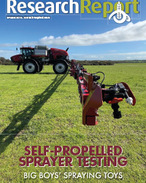This article is 3 years old. Images might not display.
The research was presented by Mike Ashworth, research agronomist, Australian Herbicide Resistance Initiative (AHRI), at the Grains Research and Development Corporation (GRDC) 2022 Grains Research Update.
AHRI performs strategic and applied research to minimise the adverse impact herbicide resistance and crop weeds have on Australian cropping.
Ashworth said that while it had long been advised that delaying seeding of weedy paddocks to maximise the effectiveness of knockdown applications results in optimal weed control, with the development of more pre-emergent herbicides and greater seed dormancy in many weed populations, early seeding may now be the optimum weed control strategy.
"With the rise of dry seeding around WA, and the resultant increases in crop yields, AHRI has put a lot of effort into understanding how growers can maintain weed control within that farming system," Ashworth said.
"In general, dry seeding out-yielded delayed seeding. This was shown in 7 of the 9 trials completed," he said.
"While delayed seeding generally resulted in lower ryegrass seed production (8 out of 10 trials), the seed production of annual ryegrass at the end of the season consistently (9 out of 9 trials) correlated with the measured pre-emergent herbicide persistence in the soil.
"The other result we found was that increasing the crop seeding rate consistently reduced annual ryegrass seed production in all trials for all herbicides used," Ashworth said.
Ashworth posed the question 'what do the results from the trial mean for future ryegrass control when growers are looking to dry-seed wheat?'
"Firstly, if you get the opportunity, dry seed your cleanest paddocks first and then delay seeding in your weedier paddocks. Low soil seed banks allow you to manage to maximise profit, so using Harvest Weed Seed Control makes sense," Ashworth said.
"Secondly, understand the key properties of your pre-emergent herbicide choice, taking into account soil type, seeding system, soil organic matter and likely rainfall after application," he said.
"Thirdly, always try to increase your crop seeding rate, or your crop competitiveness. That can be in the form of cultivar selection, seeding earlier, seeding rate, row spacing and just good agronomy.
"Finally, if you're going to dry sow, understand the frost risk," Ashworth said.
For more information, visit https://bit.ly/387XnZG























